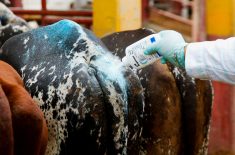Feeder cattle prices in Western Canada were $3 per hundredweight lower to $3 higher in comparison to week-ago levels. Early in the week, the downward slide in the equity markets had cattle buyers on the defensive.
However, by Friday, Alberta fed cattle prices were $4 to $5 higher in comparison to seven days earlier and buying interest resurfaced from major feedlot operators. Steers weighing 800 to 900 pounds brought back $122-$128/cwt in central Alberta but only small packages were available. Weaker barley prices and higher fed cattle values are allowing feedlot operators to capitalize on short keep cattle.
Read Also

U.S. grains: Soybeans retreat after rally, wheat holds at three-month high
U.S. soybean futures fell on Tuesday, retreating from a 16-month high hit a day earlier, as traders awaited Chinese purchases of U.S. cargoes following last week’s trade truce agreed by the world’s two largest economies.
The yearling run could be delayed by two or three weeks due to favourable pasture conditions in Western Canada. The farmer backgrounding operator appears to be selling cattle in anticipation of reloading with calves after the grain harvest. However, ranchers are in no rush to move cattle off grass and feel content waiting for higher prices.
The U.S. southern Plains are turning into a disaster, with 90 per cent of grazing lands rated poor to very poor. We are now at a time when the industry could experience significant herd liquidation in this region. This could increase fourth quarter placements and sharply tighten feeder supplies next spring. Winter wheat acres could be down sharply, limiting small grain pasture grazing over the winter.
The U.S. economy is moving through a mid-cycle slowdown. Equity markets have further deteriorated with the credit downgrade of the U.S. government. It is inevitable this will temper beef demand.
Live cattle futures are highly correlated with equity markets but cash cattle prices are on a three- to four-week lag.
— Jerry Klassen is a commodity market analyst in Winnipeg and maintains an interest in the family feedlot in southern Alberta. He writes an in-depth biweekly commentary, Canadian Feedlot and Cattle Market Analysis, for feedlot operators in Canada. He can be reached by email at [email protected] or at 204-287-8268 for questions or comments.












